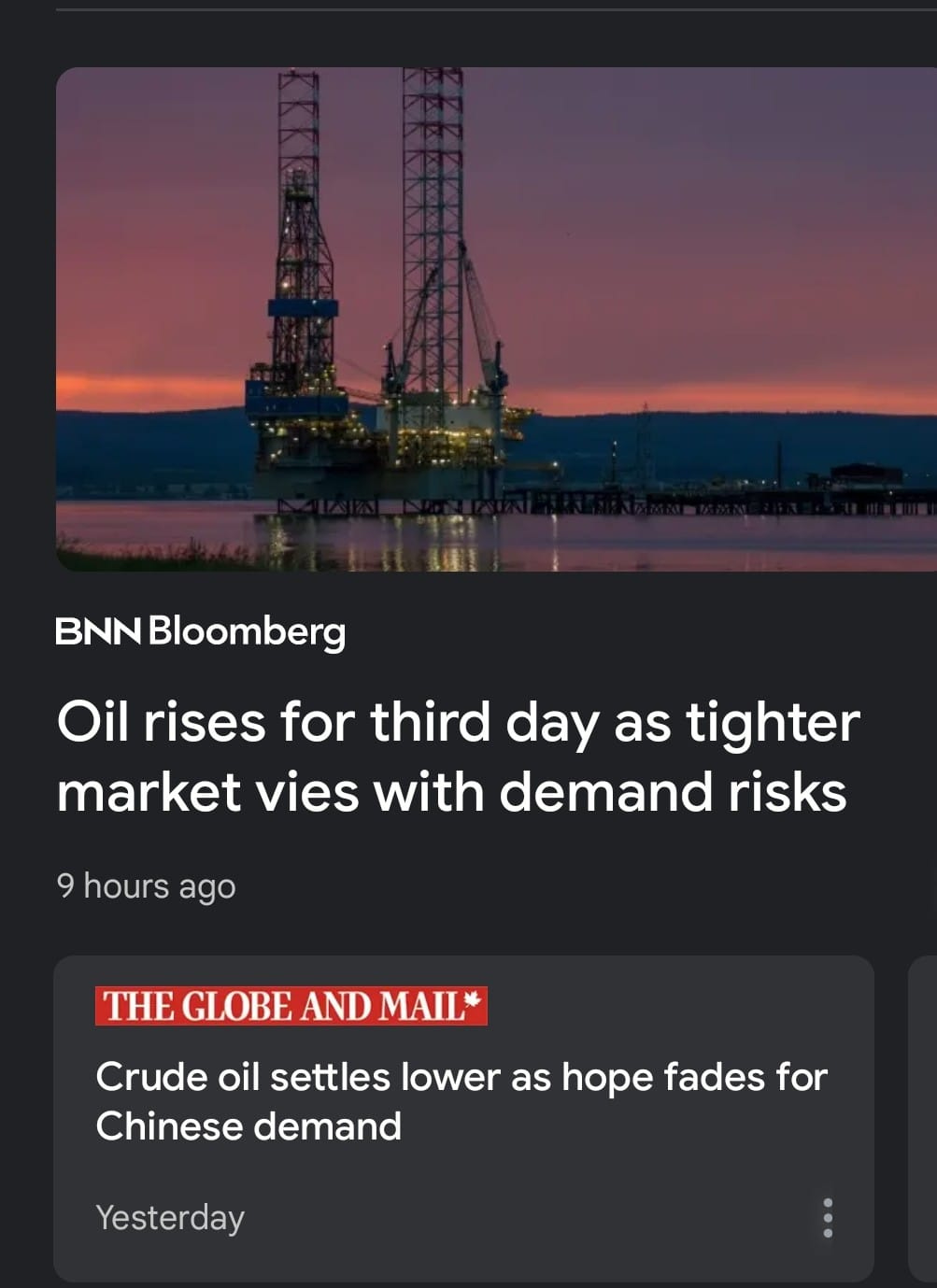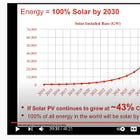I was once admonished for being "too political" in my musings about energy - which was a useful reminder that energy is political. There is also an adage that "All Politics Is Local" - on this, however, I beg to differ.
The politics of energy is global. Some politicians are waking up to this reality, some will get a rude awakening.
Energy is the lifeblood of the economy, and like-it-or-not, hydrocarbons form the lion’s share - simply in transport we can see that oil is used for 100% of aviation, 95%+ of ground transport and 100% of maritime trade (if we include LNG powered LNG carriers). However, because of the energy embedded in everything, the price of hydrocarbons impacts everything from food to phones - but nowhere is this more visible than in the price of petrol (gas, gasoline) at the pump. The price of gasoline is a political bellwether - so let’s drill-down on oil.
Of Bulls and Bears
The oil market is always opaque, but this year is no exception. Concerns over inflation (ironically in part caused by high energy prices) has led to interest rate increases - which are designed to “cool” the economy - this is shorthand for decreasing demand. High interest rates encourage saving and discourage spending and/or borrowing. What this can do in an unstable non-linear system like the economy is easily tip countries into recession or indeed worse. So fear of a “hard landing” and uber-depressed demand has been all over the headlines. Couple this with China’s apparent difficulty finding its mojo post-COVID and the Bear argument for oil is clear. Indeed, the fact that OPEC+ has had to initiate, and this week extend, voluntary production cuts would also point to a demand side issue.
For the Bulls - one can point to the fact that oil consumption is at record highs (circa 103 million barrels per day if we include NGLs), oil consumption is booming for billions outside of the focus on just US/EU/China, oil in storage (floating and onshore, with special reference to the US Strategic Reserves) is at a multi-year low, there has been a decade of under-investment in the industry (see comments below on “defunding Big Oil”), the US Shale, which has been a key element in keeping oil prices low for a decade is though to be “peaking”. Thus, one can argue that once the current minor over-supply is ironed out, there will be a major hangover - with supply unable to keep up with demand. This is the classic oil “choke-chain” or boom-bust cycle - with fears that the next one will see sky-high prices.
I have said it before, and will do so again here: I believe that the OPEC+ production cuts, led by Saudi Arabia are for the greater good. Clearly that is not the whole story, but recognizing that $50/bbl oil would lead to further under-investment and subsequent sky-high prices OPEC+ is trying to maintain a price that will encourage investment and promote longer term stability.
As another aside, OPEC+ is clearly capable of putting a floor under the oil price by production cuts. High prices can be kept in check by (1) using spare capacity to meet increasing demand, (2) prices rise high enough to limit demand (which also limits economic activity), and to a lesser extent (3) having decent volumes in storage globally. One has to wonder about the near-future. As strong demand meets weakening supply and low storage, the current spare production capacity will be quickly removed and there will be nothing and no one to limit price rises until the economy gets hurt.
High energy prices are not theoretical and will cause rationing of supply by market forces. We have seen this play-out in the gas (LNG) market in 2022-23. With Europe not buying Russian piped gas, the LNG prices were basically uncapped, even with supply increases from the USA, Qatar and Australia (as well as from Norway by pipeline).
Europe was “buying the entire market” - which directly priced many other buyers out of the market - the most infamous case being Pakistan which had a gas supply contract cancelled when ENI could pay the massive penalty and still make a profit on selling the gas volumes to Europe.
This global price-war wasn’t just price - in the case of inelastic supply, some people simply have to go without. The effect on businesses, on people losing their livelihoods, and families ability to feed themselves in Pakistan, Bangladesh and elsewhere - was a consequence of 20 years of energy policy in Europe, and was simply accelerated by Russia’s invasion of Ukraine.
Not All Politics Is Local - Energy Politics is Global
How do you spell “Irony”?
Some anti-oil activists are simply naïve, some however understand that restricting supply will push up the price of oil. This can be seen as “a good thing” because high hydrocarbon prices should (in theory) make renewable energy look much more attractive (c.f carbon taxes also). In addition price spikes are political fodder - “we have to wean ourselves off oil (and gas) to have energy-security”. Thus, creating instability and price spikes by demonizing supply could be seen as a win. This is wrong on so many levels - and the current “unprecedented” inflation in the costs of renewables is an obvious result of (a) increasing demand on finite resources, but also (b) the increase in the embedded energy costs in those supply chains. Contrary to the wishful thinking, high oil and gas prices won’t accelerate renewables, but could seriously derail their roll-out.
The activist movement to defund "Big Oil" has been relatively successful thanks to the virtue-signalling complicity of asset managers and banks - leading to an increased cost of capital. This is now compounded by higher interest rates. As an aside, one of the advantages of a high cost-of-capital is that project screening is a tough process and capital gets allocated to only the best projects. Thanks to the activists, Big Oil has got used to capital discipline, something Big Green is discovering the hard way, despite seemingly limitless subsidies. The rash of (mainly offshore wind) projects getting cancelled would indicate that capital allocation was being distorted by too much cheap money.
The unintended consequence of the defund Big Oil movement (which has also hammered mid-sized and junior companies even harder), along with government decisions to not exploit domestic oil and gas resources, is to increase the market-share of OPEC+ and hence increase their ability to manage prices. The activists’ approach to limiting supply in friendly countries is handing price-setting power to OPEC+ who are using it to stabilize prices. Oh the humanity irony!
The Other Agenda(s)
Having said that, let’s also recognize that this view of OPEC+ as a benevolent cartel is probably very naïve. Doesn’t mean its not true, only that it is just one part of the puzzle.
One doesn’t have to look far to see the effect of “all politics is local” in oil and gas - it is widely understood that many oil producing countries are caught in the resource trap - and their internal economies are heavily dependent on the revenues from oil sales - with break-even budgets running from $70/bbl to $120/bbl oil prices. So the desire to maintain oil prices can also be seen as “local” being very self-serving; political stability for many regimes comes from their ability to fund their societies.
Whilst this is undoubtedly true, its not a slam dunk - it is unclear to me whether lower production at a higher price is net positive for a country like Saudi Arabia, when looking at say the 2023 budget. Free-rider countries obviously benefit, but it may well be cash neutral for Saudi - I’d be interested in the comments if anyone has done/seen this kind of analysis.
A more nefarious agenda can also be imagined. Interference in elections in western countries has all sorts of diplomatic risks. Using social media to influence outcomes may be possible - certainly there has been a lot of noise about this - which is leading to really quite terrifying censorship responses from political classes who would traditionally be the upholders of “free speech” - but I digress.
Imagine that you are a major oil exporter and you don’t appreciate the current administration in the USA:
maybe they said “make Saudi pay the price, and make them in fact the pariah that they are”, and that still rankles, or
maybe you are fighting a land war in Europe and think the Republicans may be less inclined to help your adversary.
How to effect “regime change” in the USA? How about pushing gasoline prices up in the run-up to the election in 2024? How easy now that your price-setting power has increased thanks to western, liberal activists. Yea! (CNN completely missing the point here)
Maybe this is a pure fantasy scenario - but it is clear that the politics of energy is not just “local”.
The Social Cost of No Carbon
We have all heard of the “Social Cost of Carbon” - which is the idea that the “cost” of negative externalities from burning fossil-fuels is socialized across the entire global population. Every extra tonne of Carbon in the atmosphere has a cost to humanity. Once people have convinced themselves of this it is a small leap-of-faith to campaign to “Just Stop Oil”.
What this argument misses is the cost to the population of NOT having access to carbon based energy, let’s call it The Social Cost of No-Carbon. There are 775 million people (IEA statistic, OWID suggests 940million) with no access to electricity in 2022 - the first time in decades in which this number sadly, increased. The number of people with access to some, but only very modest energy, is many billions. Not having access to energy means there is no substitution for human labour - so people remain trapped in subsistence poverty.
The conceptual leap that is required to focus only on the carbon emissions but not on the crucial “work” that provides some “mastery of nature”, is to believe that we can simply swap out hydrocarbons for low/no carbon energy sources (with a cultish focus on wind, solar and maybe hydro). This utopian paradigm is pushed and publicised by the Merchants of Boom : see previous post here →
The message of these spreadsheet jockeys “proving” that 100% renewables is possible by [pick a date] is lapped up by a willing public and the political class - it is brilliant marketing, telling people that they can eat their cake and have it. This world-view is disputed by a lot of commentators who better understand the physical constraints of the real world - but being a Cassandra is not a sexy story to tell, and so will be ignored until something breaks : see here →
However, if you want to see and experience the real Social Cost of No Carbon - go visit my internet-friend Jusper Machuogu in Kenya - he is hosting anyone who wants to experience a Low-Carbon lifestyle for a modest fee. Don’t expect it to be easy.
There is potential to reduce the use of hydrocarbons - and again, I’m repeating myself, but I am of the opinion that burning oil is a scandalous waste of a ridiculously valuable resource - so no, EVs won’t alter the climate - but they are inherently a smart progression for society. Likewise, wind and solar won’t save the planet, but can reduce gas and coal consumption when used in a well-thought out and non-dogmatic approach to electricity supply.
At the same time, we need to recognize that for developed, and more importantly for developing countries (apologies for the outdated terminology, but I hope you know what I mean) there is a very real Social Cost of No Carbon - and that is leaving millions/billions trapped in poverty.
The Social Contract
Oil and Gas producing countries wear their hearts on their sleeves - there is no disguising the social pact whereby oil revenues buy social stability. Western countries have a more complicated relationship - assuming that there is some special mojo, or fairy-dust that allows them to create wealth and have continual “growth”.
The UK (which I have written about link below) is depressingly a leader in this regard, having abandoned much of its industrial/ manufacturing base in favour of becoming a “service economy”.
This kind-of works when the rest of the world is booming and you can sell services, but in a downturn, you get smashed. The UK economy has been underpinned by revenues from North Sea Oil since the 1970s and by increased debt since the decline in the North Sea production. Pretending that this British fairy-dust will magically continue to work is pure denial - in the meantime, the decline in basic services and increases in poverty are starting to be noticed (Why Does Everything Seem To Be Broken? - Deiter Helm).
This post is already too long, but one can look askance at most “western” countries - Canada comes to mind with its schizophrenic approach to needing its oil and gas revenues whilst simultaneously doing everything it can to shut them down AND taxing its citizens for carbon usage… As does Germany with its industrial base being undermined (if you’ll excuse the pun) by high energy costs. The massive German auto industry is facing an existential crisis as it becomes less and less competitive in the EV transition.
Just like with oil producing countries, the fabric of western societies has been an social pact - i.e. wealth and welfare, development and growth in exchange for social stability and cohesion.
The great insight of John Constable is that the conventional reading of European history - Liberty leading to Wealth Creation - is, in fact, back-to-front:
Energy creates Wealth, and Wealth allows for Liberty to flourish.
If/when/as energy costs increase and people feel that they are getting poorer and that the future is not a sunlit upland but rather a spiral of decline, what then of social cohesion?
This is the real Social Cost of No Carbon: poverty and loss of freedom.
For some this is the present that they aspire to rise up from, for others it is the future that is unwittingly being embraced.
In the techno-utopia of renewable energy advocacy there is a land blessed with no-carbon affordable and reliable energy - only, it’s just out of reach1. However, as we pursue this dream and rush headlong down the Green-Brick Road, there is a nasty surprise waiting for when the curtain gets pulled back.
#juststoptoil
Find/Follow Jusper on substack and twitter (X)
As a VERY important caveat - a low-carbon energy-rich future is possible, but would require a massive build-out of Nuclear energy. Pleasingly , there are serious green-shoots in a global nuclear renaissance despite the baffling resistance of large parts of the renewable advocacy world.










Great post.
From a transplanted Euro (sort of), it speaks volumes of the decline we are imposing upon ourselves.
Excellent. Everything you say is correct, including that quantified reality isn't sexy, and doesn't sell. My question to you (and myself, but I never have an answer) is how to get this message and wisdom to audiences of decision makers?